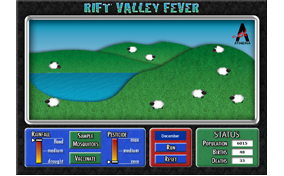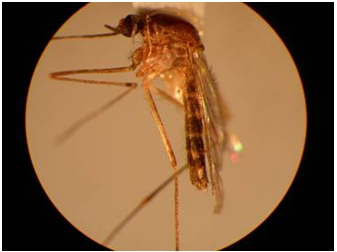Rift Valley Fever

Rift Valley Fever (RVF) is a disease caused by a common pathogen. The fever can infect livestock and human populations. Once infected, the livestock can then pass this deadly disease to other animals, quickly infecting an entire herd. Your challenge is to determine the cause of RVF and to identify the organism that moves the disease from infected to healthy animals.
What is Rift Valley Fever?
Rift Valley Fever (RVF) is a disease-causing virus that mostly affects livestock, but can also infect humans. RVF was first identified in Kenya in 1931. It is primarily transmitted through contact with bodily fluids or tissues of infected animals or through vectors such as mosquitoes that have been in contact with infected animals. It causes the spontaneous death of unborn animals, and kills 90% of young animals that it infects. Humans who get the disease may experience no symptoms at all, or may experience flu-like symptoms such as fever as well as muscle and joint pain. These symptoms usually last from 2 - 4 days. A very small number of people infected have severe symptoms that affect the eyes or cause inflammation in the brain. RVF is primarily found in south and east Africa.What is a pathogen?
A pathogen is a microorganism that causes a disease in living things. Humans have defenses against pathogens such as the immune system and helpful bacteria in the body, but if one of these is compromised by something such as antibiotic medicine, the pathogen can cause disease.What is a vector?
In biology, a vector is an organism that does not cause a disease by itself, but carries the disease from an infected host to another organism, infecting this organism with the disease. The mosquito is the main vector of RVF, especially Aedes mosquitos.What is a vaccine?
A vaccine is a dead or weakened form of a pathogen that is introduced into the body to make the host more immune to the disease. The vaccination will not hurt the host, but it allows the immune system to be exposed to the pathogen so that it "remembers" how to destroy it if it ever encounters it again.Mosquito Database
Culex pipiens
)
Walkthrough
You need to log in to access this simulation.



